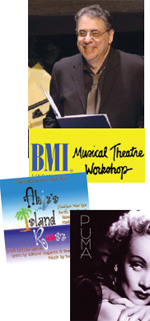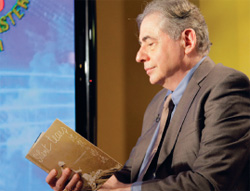IN-DEPTH
WITH THE ARTISTS
AND CREATIVE TEAM |
|||||||||||||
|
In-Depth
with Loving the Silent Tears |
|||||||||||||
“I was talking earlier about the language, and the way words go together. And you don’t expect that these particular words should follow each other, but suddenly they make total sense in the way Supreme Master has of putting this wonderful language we’ve all been blessed with. And that’s in all the songs. And you want to get the meaning, and you want to take the journey. … So what better way to express it than in a musical?” — Frank Evans, award-winning writer & lyricist
The greatly talented Frank Evans co-wrote the Off-Broadway musical Abie’s Island Rose, named one of the ten best shows of the year 2000 by The Palm Beach Post. His musical version of Dinner at Eight garnered him the Jerry Bock Award. His Back Home, the War Brides Musical won the Spirit Award for Best New Work, as well as nominations for Best Lyrics and Best of Fest at The New York Musical Theatre Festival. Credits also include the musicals, Ravenswood, Nobody’s Perfect, and No Speed Limit, plus a number of notable plays such as the biographical Puma. Mr. Evans is on the faculty of the Tony-winning BMI-Lehman Engel Musical Theatre Workshop, and is producing director of Musical Mondays Theatre Lab in New York. He is currently completing the book and lyrics for a musical about the billionaire Howard Hughes.
Q: You were one of the writers of the book for The Real Love musical last year about Supreme Master Ching Hai’s life story. And now you’re working on more of the spiritual journey as written in her poetry collection, Silent Tears. Frank Evans: After The Real Love premiered last year, I was fortunate enough to receive a letter from Supreme Master, which I was so incredibly touched. But what I was touched most by was that she said, “Thank you for finding the humor in my character and putting it on stage,” and that meant so much to me, because we worked so hard to show that someone who you might think is so holy, is also a lot of fun. Q: How was it working on the Loving the Silent Tears project? Frank Evans:
The compiling and putting
together of this particular show was a small miracle. We were
able to choose the poems and find the order they should be in
and how to find a build in it in three days, and this has never
happened before. Finding the bones of the piece, the structure
and the skeleton, it just came like a gift.
Q: Could you share your interpretation of the meaning of the “Master” that is referred to in the poetry collection Silent Tears? Frank Evans: In the poems, there are references to “Master,” and it’s quite clear that Supreme Master is not referring to herself. She’s referring to whatever It is that created this Earth, whatever force It is that allows the Earth to bear fruit, to bear grain, to have wonderful animals, to have all these diverse cultures, diverse music. And there’s someone, some Being, some Force, and that is the Master. And we need to recognize this, and we need to share a belief in this Force, this Deity that everyone shares. Q: Please tell us more about the title of the musical. Frank Evans: The one poem that was sort of the center… and the phrase is “Loving the silent tears,” and we said, “That’s the title of the show!” Tears are very strange gifts we’re given. It isn’t just for sadness. It’s for joy, and it’s for compassion, and when something moves you so much, [it’s] not because you’re sad, you’re just moved. And that’s what we’re trying to do with this show. Q: As a lyricist, please share with us the process of choosing the verses from the poetry collection so that they can be adapted into music. Frank Evans: In this particular collection of poems, what really jumped out at me were the wonderful rhythms, and they cry out to be sung. But on top of that, there’s some incredible word play, just the way that one word is juxtaposed to the other. Some of the poems just leapt out at me and they said these have to be songs. This song is called, “No Place for You.”
Oh what a great song! And sometimes you say the exact opposite of what you mean, and it comes across so clearly. Q: There is another song titled “Enlightenment” that is about a person reaching awakening in a plastic tent in a noisy holiday resort, while sleeping – rather than in the more expected manner of the great spiritual practitioners. Tell us more about that one. Frank Evans: Again, it leapt out. It said, “Oh, we’ve got to set this to music.” That poem is adorable. We never know when enlightenment is going to come to us, when a revelation is going to come to us. We never know when music is going to come to us. And I worked with one composer and she said: “Somehow the tunes are there in the air, and I have to pick them up and I have to write them out and then somebody has to sing them.” And it’s the same thing with the poems. They have to be read, they have to be sung, and people have to hear them. And that’s why there’s so much music involved in this. Q: Please tell us, what do you think will be the legacy of Loving the Silent Tears? Frank Evans: I
forget which politician it was who said, “You think the countries
are going to be remembered for the wars they’ve waged? No,
it’s going to be because of the art and the culture which
they leave behind.” And so we’re doing our small step
with Loving the Silent Tears to reinforce this. This is
what we leave behind. We leave behind the love, the good deeds,
the art, the joy of music, the joy of song, the joy of dance, it
goes beyond mere speaking, the joy of poetry. And I think more
and more about how Supreme Master encourages the arts. If music
and poetry can unite the world and the thoughts in here can unite
the world, and a number of the theories and beliefs from Supreme
Master can unite the world, oh what a better place we’d have.
|
|||||||||||||
 Mr.
Evans adapted Supreme Master Ching Hai’s poetry collection
Silent Tears so that they could be set to songs for Loving
the Silent Tears. Please enjoy this excerpt from an interview
with Supreme Master Television in which Mr. Evans shares his
thoughts about working on the musical.
Mr.
Evans adapted Supreme Master Ching Hai’s poetry collection
Silent Tears so that they could be set to songs for Loving
the Silent Tears. Please enjoy this excerpt from an interview
with Supreme Master Television in which Mr. Evans shares his
thoughts about working on the musical. 